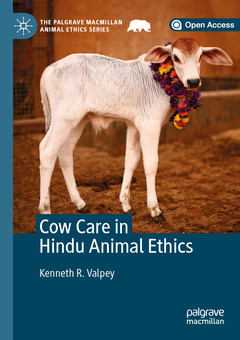1. Introduction.- 2. The Release of Cosmic Cows.- 2.1. The Rigveda: cows ranging in meaning.- 2.2. The Upanishads: cows and the acquisition of higher knowledge.- 2.3. The Bhagavata Purana: cows and the acquisition of higher knowledge.- 2.4. Krishna and his cows in Vraja.- 2.5. Vraja bhakti poetry: the buttery sweet language of love.- 2.6. Concluding reflections.- 3. Cows in Contested Fields.- 3.1. Hindu's modern concern for cows.- 3.1.1. Dayananda Saraswati: “cow-reservoir of compassion”.- 3.1.2. Mahatma Gandhi: “the law of our religion”.- 3.1.3. B.R. Ambedkar: compassion denied the “Untouchables”.- 3.1.4. Bhaktivedanta Swami Prabhupada: cow care for the world.- 3.2. Ancient texts, modern controversies.- 3.2.1. Nonviolence preferred in Dharmashastra.- 3.2.2. Thinking aloud in the sacrifice of war.- 3.2.3.Violence, nonviolence - and cows in the Bhagavad-gita and Bhagavata Purana.- 3.3. Concluding Reflections.- 4. Surveying the Cow Care Field.- 4.1. Cows (un)sheltered.- 4.2. The economics of reverence and care.- 4.3. Bovine products as added value.- 4.3.1. Milk.- 4.3.2. Ghee.- 4.3.3. Dung and Urine.- 4.3.4. Panchagavya.- 4.4. Male bovine care and the issue of violence.- 4.5. Intangible benefits of bovine care and proximity.- 4.5.1. Bovines as purifying agents.- 4.5.2. Learning lessons from cows.- 4.5.3. "Keeping cows, you keep your sanity".- 4.5.4. Go-seva and bhakti.- 4.5.5. Ritual bovine veneration: creating and affirming community.- 4.6. Concluding reflections.- 5. Cow Care and the Ethics of Care.- 5.1. Dharma and animal ethics.- 5.1.1. Dharma as settle duty.- 5.1.2. Dharma as deliberation on right action.- 5.1.3. Dharma as cultivation of virtue.- 5.2. From dharma to yoga.- 5.3. From yoga to bhakti.- 5.4. Reverence in the bhakti paradigm.- 5.5. Ethics of care and Hindu animal ethics.- 5.6. Animal citizenship, community, and bhakti.- 5.7. Sharma-based communitarianism.- 5.8. Concluding references.- 6. "These Cows Will Not Be Lost" - Envisioning A Care-Full Future for Cows.- 6.1. Anticipatory communities.- 6.1.1. Mayapur Chandrodaya Mandir, West Bengal.- 6.1.2. New Vraja Dhama, Hungary.- 6.2. Departing bovine souls.- 6.2.1. Contested lives at Bhaktivedanta Manor and Skanda Vale.- 6.2.2. Krishna the ox breathes his last in Vrindavan.- 6.3. When cow protection activism becomes counter-productive.- 6.4. Cow protection in three qualities.- 7. Concluding Ruminations.- 7.1. Changing tastes.




